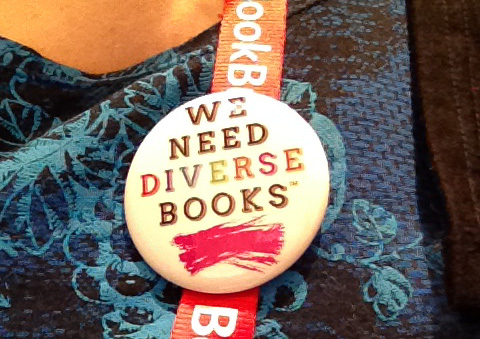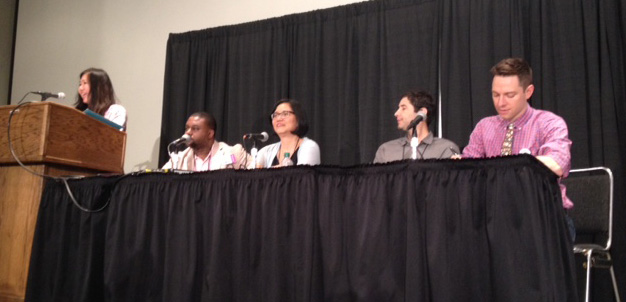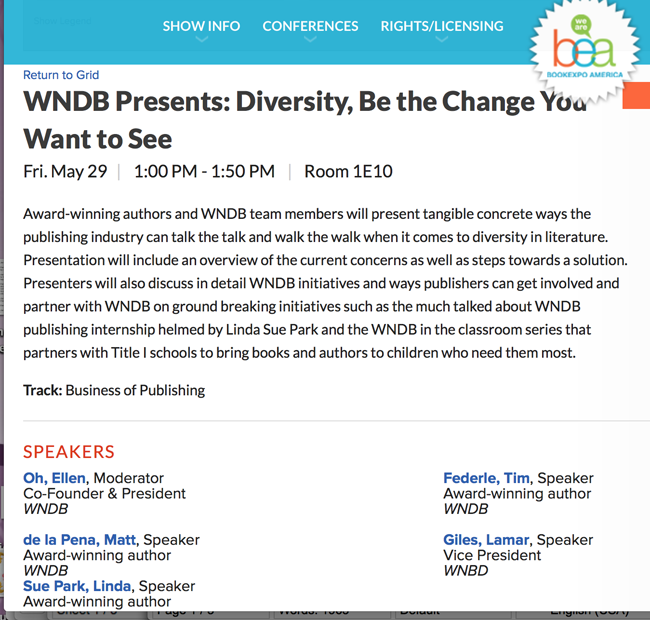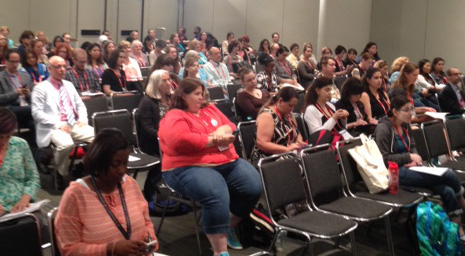
I was so glad I got to catch one of the We Need Diverse Books panels at this year’s BookExpo America. I am a fast typist so I am able to capture a lot of what was said, but nowhere close to everything, so please do no take this as a “transcript.” It isn’t. It’s a selection of the comments made and may contain errors because I can’t type perfectly and listen at the same time! But I wanted to capture as much as I could so that people who couldn’t be here could still hear this conversation. Because it is such an important conversation no matter what genre you write or publish in.
The panel included:
Ellen Oh, author of The Prophecy Series, co-founder
Lamar Giles, author of Fake ID and Endangered
Linda Sue Park, Newbery Award-winning, NY Times bestselling author
Matt de la Peña, NY Times bestselling author of multiple books
Tim Federle, author of Better Nate Than Ever and Tequila Mockingbird
Ellen Oh (moderator): We started here last year because people reacted to a lack of diversity, and this year we have three panels going on so it looks a lot like our voices are starting to be heard. We’re not going away anytime soon!
Lamar Giles: I’ve been a part of WNDB since the beginning We’ve been working on a lot of initiatives. Our Walter Dean Myers award will be presented for the first time next year, for an awesome diverse author who writes an awesome diverse book. We all know awards bring recognition and prestige to books and we hope to raise the awareness of books and to make it more attractive to publishers to do those books. There will also be some grants for unpublished authors to hopefully help the next great writers who will be the next writers to push our movement further.
Linda Sue Park: I’m an author and I’ve written several picture books and middle grade novels with Houghton-Harcourt and even though I don’t have a new book out, they helped support my appearance here at BEA. I am so excited about the internship program. We’ve been around for a while. We’ve often spoken about how tired we are. We felt like the needle was stuck. “We need diverse books. Children need to see themselves.” Over and over. We know what the problem is. But we need the answers. I was watching from the sidelines and at first I was rolling my eyes at WNDB. And this time I saw a difference, though because it came from the grass roots. So I jumped in and got involved. I have been privileged to work with many great people in publishing, but you don’t see the same kind of diversity in the cubicles as you see in the country. Well, many publishing professionals get their start as interns, and so we thought if we could diversify the interns it could lead to more people in publishing. You use the word “diversity” and sometimes people buttons get pushed. But how about “choice” and “variety”? When you’r a bookseller or a librarian what you want to do is give your customers a greater variety, and if you won’t do it because it’s the “right thing to do” do it because it’s good for sales. We’re hoping the internship will be seeds that will grow in the long term. It’s $2,500 grants that help the interns take the job. We will be picking 5 for this year and we have really wonderful candidates and 10 publishers who will be part of the program.
Matt De La Pena (Author of Last Stop in Market Street, advisory board member of WNDB): I want to give a hand to Linda Sue Park bc she has been in publishing for a long time and opening these doors for a long time. I jumped into WNDB because it felt like a cohesive movement was forming. It started on Twitter as a hashtag but it grew and grew. It’s sticking because of the cohesiveness. I knew it was turning into a thing when I went to Los Angeles and they had a real film crew there to work with me. I get to go to a lot of schools now. I got to some schools and it is 100% diverse students and they LOVE to see themselves in books. But remember they also love the Gail Forman books. One thing I see is that reluctant readers need to feel comfortable with the book on page one. And maybe a POV character that feels authentic and identifiable to the reader is a huge part of that.
Tim Federle: I feel so honored to be up here with you guys. I’d come from a background of dancing on broadway, and I did that for about ten years. And when I sat down to write Nate, my agent told me “write the book only you can write.” I was one of the coaches on the boys in Billy Elliot at the time, and I dug into my own experience being in 7th grade and knowing that I was “going to be gay.” When you write for young people you also write for their parents and for librarians. I hear from 70 year olds who tell me “IF I had read your book 35 years ago mayeb I would have come out sooner” or 12 year olds “I’m the only boy in my dance class in Utah and it was so cool to see a character like Nate.”

Ellen: I stole this story from Sarwat Chaddah. He tells a story about talking to a bookseller about his series. And the bookseller telling him “We don’t need your book because we don’t have any Indians in our community.” And he said “I bet you don’t have any hobbits either.” We have these shelf talkers now that praise various books that don’t use the words “diversity” or “asian books” or what. We’ve been using them not as Issue Books but as Books Everyone Can Enjoy. We do these with School Library Journal.
Lamar: I was watching a documentary on TV the other night and they were interviewing a man in Georgia who looked about 45 and he was saying they shouldn’t integrate the prom in his town–they were still having a black prom and a white prom. And he said he was taught by his grandmother that a red bird and a blue bird shouldn’t be together. These messages are taught. We have to fight that. We have to get people when they’re young.
LindaSue: I think children’s books are a PIECE of the solution. Family and culture are HUGE factors. A really great series of diverse books isn’t going to overcome that. We have to change the ways we think. It’s not just what we don’t know, it’s that we don’t know what we don’t know. How can I go through life to discover what I don’t know, with my heart open? I’m not naive enough to think wonderful children’s books will change society but it is a piece of it and every day how can we–booksellers teachers librarians– be a part of lessening the hate?
Matt: I was a judge on the National Book Awards a few years ago, and I discovered that you have to be a little subversive. There was a book that came to my attention because of its literary merit, but it was a diverse book about a Vietnamese girl who moved to Alabama. At first I thought it would be a great book for a foreign exchange student, but then I thought I’m thinking too narrow. It’s a much more important book for the rest of the class to feel like they can accept that foreign exchange student. So I waited until all the other judges had finished their beer flights at lunch before I came on strong for that book.
Tim: I went into a library recently and one of the books on display was and Tango Makes Three! And the display didn’t say “Hey! Gay Books for June!” it said “Great Books About Family.” It’s really hard to hate somebody that you get to know. The great thing about telling YOUR story that only you can tell, is that someone gets to know you through your book.
Ellen: Tim, tell us about cancellations and how to deal with them.
Tim: Now that my books have been out for a few years, they’ve gotten past the fact of what’s in the book. They’re contacting me to ask me to come speak and they know what’s in it. Whereas when it first came out my own middle school cancelled my book launch a week before the event. Some days you want to be a fighter but sometimes you just need a hug. Somedays you have to be like Larry Kramer and stand on a soapbox and shout We’re In a War! And somedays you just need one of those beer flights with Matt De La Pena and huddle up with the people who support you. Ultimately it comes down to the gatekeepers. Booksellers, librarians, you are the ones who have to help us out. Every kid needs to have that cool aunt who lives on the coast slipping you these subversive books.
Ellen: Turns out, according to the ALA that disproportionately the books that are banned are by diverse authors.
Matt: I did five prisons recently the day before a teen lit fest that would 1000 teens. The prison community is 99 percent people of color, whereas I knew the teen lit fest would be 99% white. When I published “Mexican White Boy” I saw in Arizona things like the schools where they came into a class where they were reading it and literally took the books out of the students’ hands. They were put into a box literally labeled BANNED, even though the superintendent said “Oh it’s not banned, it’s only pulled from the curriculum.” But it even says BANNED on it! They thought it was somehow an anti-white book? But I am mixed, I am part white and part Mexican so how can it be anti-white? I mean I have days where it’s like I’m somehow not Mexican enough. But other times I have someone call me and say “you’ll come talk to my class and you’ll be our Mexican author!” And I’ll say that’s kind of problematic… Then they’ll say well, we’ll pay you THIS MUCH, and I say, “Great! I’ll be your Mexican author!” (audience laughs) But then there’s a thing we should mention which is how important it is for there to be diverse characters where the book isn’t about that character being diverse.
Tim: I’m so excited about some of these books coming out now that are crossing over. As soon as we have a Harry Potter scale book that features diverse characters, there will be no looking back. Simon versus the Homo Sapiens agenda and some other books like that are so exciting because they’re so well written, such good quality, and they are starting to make inroads. You used to hear things like “women can’t open a comedy” and then Bridesmaids was huge in Hollywood.
Linda Sue: Diversity does have some successes in other media. Dora the Explorer is brown, and everyone is buying it. I think to myself we’re book people! We’re smarter than television people! How come they have their diversity and we don’t?
Important takeaway from each panelist:
Tim: Be careful of the “my diversity if bigger than your diversity” thing. As an LGBTQ-and-sometimes-Y person, where we add a new letter every other day, I think it’s important to keep a really big Thanksgiving dinner table where there’s room for everybody at the table.
Matt: I want to say that the Mexican issue is the most important one! (laughter) We need to seek out the new voices. It’s easy to be like “oh I have my favorite black author.” You have to keep broadening.
Linda Sue: There’s no doubt it’s problematic and difficulty. I am privileging certain books. I’m fortunate to be part of a community that I don’t get shot at because of the color of my skin. I think it’s really important to realize that.
Lamar: It’s important to keep fighting, to keep pushing. Handsell that book, discover a new voice and let people know about it. Spread the word.


